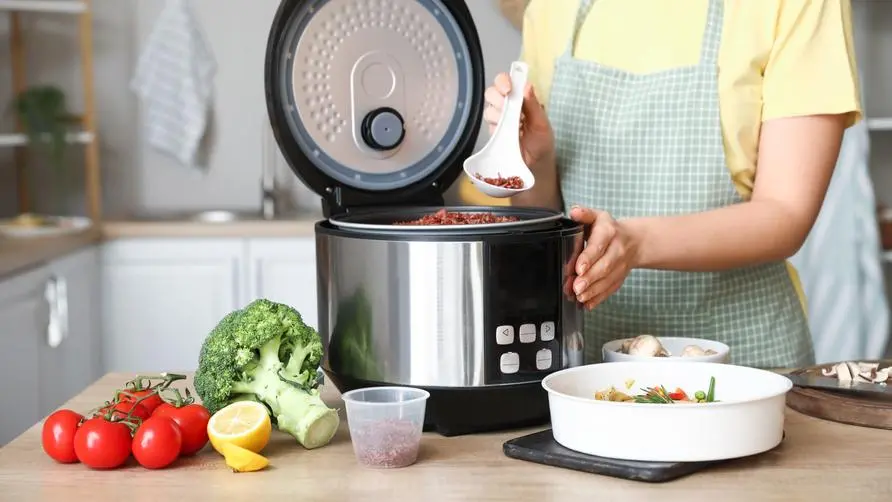Can covering pots and keeping electric pots warm reduce bacteria? Food cannot be left for more than "1 hour"? Experts reveal food safety principles for "overnight dishes"

Do you cook too many New Year’s and New Year’s dishes and cover the pot with a “vacuum” to reduce the growth of bacteria?
As the New Year approaches and the Spring Festival approaches, most families will prepare sumptuous meals and New Year dishes. If the lid is placed on the pot after cooking, will the “vacuum” be maintained to reduce the growth of bacteria and toxins? Toxicology expert Professor Chiu Mingwei of the Department of Biotechnology of Chung Yuan University said that bacteria exist in the environment and food itself, and bacteria are classified into “aerobic” and “anaerobic”. Just using the pot lid to isolate the air is enough. The “sterilization effect of electric pot” may not be able to inhibit the growth of bacteria.
Professor Zhao Mingwei explained that Escherichia coli, Staphylococcus aureus, etc. are aerobic bacteria, and reducing the contact between food and air through pot lids is indeed less likely for bacteria to grow. However, anaerobic bacteria such as Clostridium botulinum are more likely to breed and grow in an environment lacking oxygen. Not all bacterial growth problems can be eliminated by covering the pot.
There is another saying in the market that if the food is cooked and covered immediately, the food can be kept fresh without refrigeration? Professor Zhao Mingwei reminded that this approach is theoretically feasible, but there are only two points to note: First, protein and oily foods will deteriorate over time, and reducing contact with bacteria can only last longer. Secondly, since the lid of the pot is not truly “vacuum-like,” food placed in a humid and high-temperature environment will still be at risk of bacteria and mold growing.
Can repeated heating of overnight dishes kill all the bacteria? It is best not to leave food for more than 1 hour
Can reheating overnight dishes or leftovers ensure that bacteria and toxins are killed? Professor Zhao Mingwei said that if the temperature is above 100 degrees Celsius, the bacteria can indeed be killed after a period of complete heating. However, another problem with overnight dishes is that bacteria will produce “endotoxins” after they grow. To destroy the endotoxins, the heating temperature may need to be above 160 degrees. General microwaves, boiling, and electric pot sterilization cannot eliminate them. It is recommended that the food should not be left out. Too long.
Professor Zhao Mingwei explained that bacteria are actually everywhere, and there are many bacteria in the ambient air and on the human body. The temperature of food after cooking is about 90-100 degrees Celsius. After it is served on the table, the temperature begins to drop. When it drops to 70-80 degrees Celsius, bacteria begin to grow easily. The longer the food is left, the more people come into contact with it, and the temperature drops, all increase the risk of food bacteria growing.
Professor Zhao Mingwei suggested that considering the temperature and humidity in Taiwan, it is recommended that food should not be left on the table for more than 1 hour. If left for too long, it will easily come into contact with bacteria in the air, environment and the mouths of different diners. If it is placed again Overnight, bacterial growth problems tend to get worse. It is recommended that if there is leftover food for the New Year’s Eve and New Year dishes, try to finish it every other meal and do not place it more than every other meal.
Are there too many bacteria in food eaten out or at roadside stalls? How long can an electric cooker keep warm?
If the food is purchased from outside rather than cooked by oneself, can it be stored for a longer period of time? Professor Zhao Mingwei believes that it is not recommended to eat instant foods from snack bars, roadside stalls, night market vendors, and even supermarkets after meals. Firstly, the cooking method cannot be mastered. Secondly, many snack bars, roadside stalls, and open-style food are not recommended. Most buffet restaurants cook food in an open environment, exposing them to more risks of environmental bacteria or toxins. Some people do not disinfect their hands when picking up food or spray foam from the mouth, which may allow bacteria to breed in the food.
Can unfinished food be kept warm longer by using an electric cooker? Professor Zhao Mingwei believes that it is feasible to use electric pots and electronic pots to keep warm in a short period of time, but the keeping temperature is usually only 70-80 degrees, which cannot completely kill bacteria. Over time, food is prone to spoilage, and bacteria will also breed. It is recommended to discard unfinished food every other meal. It is especially not recommended to keep food warm at night until eating in the morning. The longer the time, the higher the risk of bacteria in the food.
Three principles for overnight vegetable processing: complete isolation, low-temperature storage + thorough heating
Professor Zhao Mingwei reminded that if you really need to preserve leftovers or overnight dishes, you must take three major precautions: complete isolation, low-temperature storage, and complete heating. First of all, after finishing the meal, you should store it properly with plastic wrap to reduce contact with air. Furthermore, leaving it at room temperature or keeping it warm in an electric pot will only have a short-term effect. It is still recommended to put leftovers in the refrigerator, which can better inhibit the growth of bacteria. Finally, the overnight dishes should be completely heated before eating. The heating temperature and time must be long enough, at least above 100 degrees Celsius, and heated continuously for 5-10 minutes.
Professor Zhao Mingwei pointed out that in addition to the problem of bacterial growth, leftovers or overnight dishes also have poor taste and texture. It is recommended that the public should adhere to the principle of moderation whether they are preparing New Year’s Eve dishes or cooking New Year dishes, and avoid eating improperly preserved overnight dishes. Vegetables, swallowed have potential bacterial risks affecting your health.





